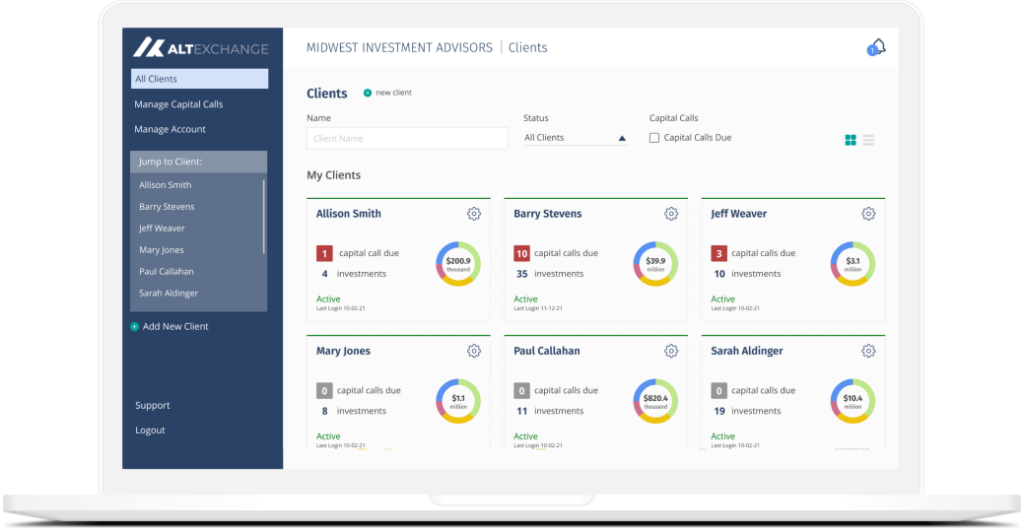It’s no secret that the 60/40 portfolio is not the standard anymore, and 2022 proved just that. Alternative investments are more popular than ever among both investors and advisors, with no signs of slowing down anytime soon.
Here are the top 10 alternative investments we saw gain the most popularity in 2022.
Top 10 Alternative Investments in 2022
1. Cryptocurrencies
Cryptocurrencies are digital or virtual tokens that use cryptography to secure their transactions and to control the creation of new units. Bitcoin, the first and most well-known cryptocurrency, was created in 2009. Cryptocurrencies are often traded on decentralized exchanges and can also be used to purchase goods and services.

2. Hedge Funds
Hedge funds are investment vehicles that use a variety of strategies to achieve their goals. These strategies can include investing in stocks, bonds, and other securities, as well as using hedging tactics to reduce risk. Hedge funds are often open to a limited number of investors and require a high minimum investment.
3. Private Equity
Private equity (PE) is a type of equity that is not traded on a public exchange. PE firms typically invest in private companies, either by purchasing a controlling interest or by providing capital to help the company grow. PE firms often seek to improve the operations of their portfolio companies and to sell them at a profit after a period of time.

4. Venture Capital
Venture capital is a type of private equity that is focused on early-stage and high-growth companies. VC firms typically invest in companies that have a strong team, a well-defined business plan, and a large potential market. VC firms often provide not only capital but also expertise and mentorship to help their portfolio companies grow.
5. Real Estate
Real estate is an investment that involves buying and owning property. Real estate can be used for a variety of purposes, such as housing, commercial space, or agricultural land. Real estate can also be rented out to generate income.

6. Infrastructure
Infrastructure as an investment is a term used to describe the purchase and ownership of physical assets such as bridges, roads, and hospitals. These assets are often used to provide essential services such as transportation, communication, or healthcare. Infrastructure investments can be made by private companies, governments, or public-private partnerships.
7. Natural Resources
Natural resources as an investment refers to the buying and ownership of physical assets such as oil, gas, and minerals. These assets are often used to provide essential services such as transportation, communication, or healthcare. Natural resources investments can be made by private companies, governments, or public-private partnerships.

8. Art and Collectibles
Art and collectibles can be a valuable investment if they are chosen carefully. Many art and collectible investments are made in rare or unique items that may appreciate in value over time. These investments can be risky, as the value of the item may not always be stable.

9. Private credit
private credit as an investment refers to the lending of money to businesses and individuals by private lenders, rather than by a bank. Private credit can be used to finance a variety of business needs, such as the purchase of inventory or the expansion of operations. Private credit is often seen as a more risky investment than traditional bank loans, but it can also offer higher returns.
10. Carbon Credits
Carbon credits as an investment are certificates that represent the right to emit one metric ton of carbon dioxide. These certificates can be traded on exchanges and can be used to offset emissions from factories, vehicles, or other sources. The purchase of carbon credits can help companies and individuals reduce their carbon footprint and lower their environmental impact.

How to Manage Alternative Investments
Many alternative investment asset classes are more complex to manage than traditional alternative investments. Not to mention, most investors and advisors are still tracking via manual, messy spreadsheets.
As we head into 2023, and alternative investments continue to grow, it’s imperative for investors and advisors handling complex portfolios to have a simple, scalable solution in place to manage all the complexities of their growing portfolio.

AltExchange eliminates common pain points of managing complex alternative investments including fragmentation, unstructured data, scattered documents, limited performance visibility, and more. If you’re an advisor, investor, or asset manager looking for a full-solution management and reporting solution for alternative investments, please get in touch.